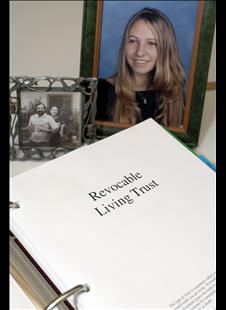|
|
Estate Planning
Monday, November 14, 2016

There are many benefits to a revocable living trust that are not available in a will. An individual can choose to have one or both, and an attorney can best clarify the advantages of each. If the person engaged in planning his or her estate wants to retain the ability to change or rescind the document, the living trust is probably the best option since it is revocable.
The document is called a “living” trust because it is applicable throughout one's lifetime. Another individual or entity, such as a bank, can be appointed as trustee to manage and protect assets and to distribute assets to beneficiaries upon one's death.
A living trust will also protect assets if and when a person becomes sick or disabled. The designated trustee will hold “legal title” of the assets in the trust. If an individual wants to maintain full control over his or her property, he or she may also choose to remain the holder of the title as trustee.
It should be noted, however, that the revocable power that comes with the trust may involve taxation. Usually, a trust is considered a part of the decedent’s estate, and therefore, an estate tax applies. One cannot escape liability via a trust because the assets are still subject to debts upon death. On the upside, the trust may not need to go through probate, which could save months of time and attorneys' fees.
The revocable living trust is contrary to the irrevocable living trust, in that the latter cannot be rescinded or altered during one's lifetime. It does, however, avoid the tax consequences of a revocable trust. An attorney can explain the intricacies of other protections an irrevocable living trust provides.
Anyone who wants to keep certain information or assets private, will likely want to create a living trust. A trust is not normally made public, whereas a will is put into the public record once it passes through probate. Consulting with an attorney can help determine the best methods to ensure protection of assets in individual cases.
Monday, October 10, 2016

So, you have a will, but is it valid? A will can be contested for a multitude of reasons after it is presented to a probate court. It is in your best interest to have an attorney draft the will to prevent any ambiguity in the provisions of the document that others could dispute later.
A will may be targeted on grounds of fraud, mental incapacity, validity, duress, or undue influence. These objections can draw out the probate process and make it very time consuming and expensive. More importantly, an attorney can help ensure that your property is put into the right hands, rather than distributed to unfamiliar people or organizations that you did not intend to provide for.
At the time you executed the will, you must have been mentally competent, or of “sound mind.” A court will inquire as to whether you had full awareness of what you were doing. There will also be an inquiry into your understanding and knowledge of the assets in your name. If, at the moment you executed the will, you were pressured or influenced by another individual to sign the document, it may be invalidated.
If the document was signed under duress or undue influence, the provisions are likely to be against your intentions or requests. Moreover, if you are trying to nullify a will on your own behalf, you are likely to need an attorney because it is very difficult and complicated to demonstrate the existence of duress, fraud, or undue influence. If drafting a new will, counsel can ensure that your document abides by all of the validity requirements, so the will’s provisions can successfully carry out your intentions after your death.
For example, the will creator or “testator,” is usually required to sign the document before several witnesses who are over the age of eighteen, during a certain period of time. A will or a certain bequest to a person could be deemed void if the beneficiary was also a witness. In your state, you may be able to execute a “self-proving affidavit,” which may do away with some of the requirements in order to establish a valid will. The testator should also designate a person to execute the document. Consult your attorney to ensure that your will comports with your state’s particular laws and is sustainable against any future contests.
Monday, September 12, 2016

Inheritance laws involve legal rights to property after a death and such laws differ from state-to-state. Heirs usually consist of close family members and exclude estranged relatives. Depending on the wording of a will, an individual can be intentionally, or even unintentionally, disinherited.
In most cases, spouses may not be legally disinherited. Certain contracts, however, allow for a legitimate disinheritance, such as prenuptial agreements or postnuptial agreements. These contracts are typically valid methods of disinheritance because the presumed-to-be inheriting spouse has agreed to the arrangement by signing the document.
If there is no prenuptial arrangement, then the state’s elective share statute or “equitable distribution” laws protect the surviving spouse. Pursuant to the elective share statute, he or she may collect a certain percentage of the estate.
In states that follow “community property” or “common law” rules, however, the outcome may be different. An attorney should be consulted for clarification of the differences in the law. Divorces affect spousal inheritance rights. Post-divorce, it is prudent to consult an attorney to draft a fresh will, in order to prevent confusion and unintentional dissemination of assets.
If the will is unambiguous, it is usually possible for a child to be disinherited. It should be noted, however, that it is highly likely that close relatives will challenge or contest a will in which they have been disinherited. Fighting such a lawsuit may put a great financial strain on the estate's assets. Depending on how time-consuming and expensive it is to defend the will, less money may be available for distribution to the intended beneficiaries.
There are ways to protect estate assets from such problems, for example through trusts. It is essential for an individual to receive the counsel of a licensed lawyer in order to effectively protect his or her estate as inexpensively as possible.
Monday, August 15, 2016

In states that have “elective share statutes,” a surviving spouse is legally entitled to a certain percentage of the deceased's estate, even if that spouse has attempted to disinherit or to provide a lesser bequest, or gift, under the will. In “separate property” states, an elective share statute is likely to be in effect. If the estate in question is valued at $50,000 or less, the elective share is likely to be the actual amount of the net estate.
“Testamentary substitutes” are removed from particular assets that would otherwise pass to the surviving spouse. Assets passing by will or through intestacy could cause a reduction in the elective share amount as well. Totten trusts, such as Payable-On-Death Bank Accounts (PODs), Retirement or joint bank accounts, gifts causa mortis ("gifts made by the decedent in contemplation of death,”) U.S. savings bonds, jointly held property, and gifts or transfers that were made approximately one year prior to death, are some examples of testamentary substitutes.
If a gift was made about one year prior to death, yet involves medical or educational expenses, then the gift may not qualify as a true testamentary substitute. With regard to PODs, the spouse, offspring, or grandchildren will be named as beneficiaries. The funds of a POD are only distributed upon the decedent’s death. Testamentary Trusts are listed in the will until the designated property passes to the trust upon the testator’s death.
Generally, a gift causa mortis is only active upon the decedent’s expected death and is typically revocable. Moreover, certain elements must exist to create a valid gift causa mortis. These include an intent to create “an immediate transfer of ownership,” valid delivery, acceptance of the gift by the donee, and the donor’s “anticipation of imminent death.” There are also certain circumstances by which gifts causa mortis are not valid. For example, if the donee passes away before the donor, it is unlikely that a property interest was transferred. Gifts causa mortis are also taxed as if the testator had listed the gifts in his or her will.
In such cases, testamentary substitutes are generally put back into the net estate total to determine the elective share amount that the surviving spouse will collect. The aforementioned may vary if property is held jointly, as joint tenants or otherwise, because the spouse may have a right of survivorship in the property. Estate planning attorneys are aware of all the ins and outs of testamentary substitutes and how they may affect the distribution of your assets. It is useful, if not essential, to consult with a knowledgeable attorney when making arrangements regarding testamentary substitutes.
Monday, May 30, 2016

An executor is responsible for the administration of an estate. The executor’s signature carries the same weight of the person whose estate is being administered. He or she must pay the deceased’s debts and then distribute the remaining assets of the estate. If any of the assets of the estate earn money, an executor must manage those assets responsibly. The process of doing so can be intimidating for an individual who has never done so before.
After a person passes away, the executor must locate the will and file it with the local probate office. Copies of the death certificate should be obtained and sent to banks, creditors, and relevant government agencies like social security. He or she should set up a new bank account in the name of the estate. All income received for the deceased, such as remaining paychecks, rents from investment properties, and the collection of outstanding loans receivable, should go into this separate bank account. Bills that need to be paid, like mortgage payments or tax bills, can be paid from this account. Assets should be maintained for the benefit of the estate’s heirs. An executor is under no obligation to contribute to an estate’s assets to pay the estate’s expenses.
An inventory of assets should be compiled and maintained by the executor at all times. An accounting of the estate’s assets, debts, income, and expenses should also be available upon request. If probate is not necessary to distribute the assets of an estate, the executor can elect not to enter probate. Assets may need to be sold in order to be distributed to the heirs. Only the executor can transfer title on behalf of an estate. If an estate becomes insolvent, the executor must declare bankruptcy on behalf of the estate. After debts are paid and assets are distributed, an executor must dispose of any property remaining. He or she may be required to hire an attorney and appear in court on behalf of the estate if the will is challenged. For all of this trouble, an executor is permitted to take a fee from the estate’s assets. However, because the executor of an estate is usually a close family member, it is not uncommon for the executor to waive this fee. If any of these responsibilities are overwhelming for an executor, he or she may elect not to accept the position, or, if he or she has already accepted, may resign at any time.
Monday, May 16, 2016

There are many factors to consider when deciding whether or not to implement Medicaid planning. If you’re in good health, now would be the prime time to do this planning. The main reason is that any Medicaid planning may entail using an irrevocable trust, or perhaps gifts to your children, which would incur a five-year look back for Medicaid qualification purposes. The use of an irrevocable trust to receive these gifts would provide more protection and in some cases more control for you.
As an example, if you were to gift assets directly to a child, that child could be sued or could go through a divorce, and those assets could be lost to a creditor or a divorcing spouse even though the child had intended to hold those assets intact in case they needed to be returned to you. If instead, you had used an irrevocable trust to receive the gifted assets, those assets would not have been considered the child’s and therefore would not have been lost to the child’s creditor or a divorcing spouse. You need to understand that doing this type of planning, and using the irrevocable trust, may mean that those assets are not available to you and therefore you need to be comfortable with that structure.
Depending upon the size of your estate, and your sources of income, perhaps you have sufficient assets to pay for your own care for quite some time. You should work closely with an attorney knowledgeable about Medicaid planning as well as a financial planner that can help identify your sources of income should you need long-term care. Also, you should look into whether or not you could qualify for long-term care insurance, and how much the premiums would be on that type of insurance.
Monday, May 9, 2016
 Testamentary capacity refers to a person’s ability to understand and execute a will. As a general rule, most people who are over the age of eighteen are thought to be competent to make and sign the will. They must be able to understand that they are signing the will, they must understand the nature of the property being affected by the will, and they must remember and understand who is affected by the will. These are simple burdens to meet. However, there are a number of reasons a person might challenge a will based on testamentary capacity. Testamentary capacity refers to a person’s ability to understand and execute a will. As a general rule, most people who are over the age of eighteen are thought to be competent to make and sign the will. They must be able to understand that they are signing the will, they must understand the nature of the property being affected by the will, and they must remember and understand who is affected by the will. These are simple burdens to meet. However, there are a number of reasons a person might challenge a will based on testamentary capacity.
If the testator of a will suffers from paranoid delusions, he or she may make changes to a testamentary document based on beliefs that have no basis in reality. If a disinherited heir can show that a testator suffered from such insane delusions when the changes were made, he or she can have the will invalidated. Similarly a person suffering from dementia or Alzheimer’s disease may be declared unfit to make a will. If a person suffers from a mental or physical disability that prevents them from understanding from understanding that a will is an instrument that is meant to direct how assets are to be distributed in the event of his or her death, that person is not capable of executing a valid will.
It is not entirely uncommon that disinherited heirs complain that a caretaker or a new acquaintance brainwashed the testator into changing his or her will. This is not an accusation of incapacity to make the will, but rather a claim of undue influence. If the third party suggested making the changes, if the third party threatened to withhold care if the will was not changed, or if the third party did anything at all to produce a will that would not be the testator’s intent absent that influence, the will may be set aside for undue influence. Regardless of the reason for the challenge, these determinations will only be made after the testator’s death if the will is presented to a court and challenged. For this reason, it is especially important for the testator to be as thorough as possible in making an estate plan and making sure that any changes are made with the assistance of an experienced estate planning attorney.
Monday, April 18, 2016

Life insurance can be an integral part of an estate plan. Policies can be set up to be paid directly to the beneficiary, without the need to pass through the estate, and without the need for any taxes to be paid. Having a life insurance policy ensures that some assets will be liquid, so that debts and expenses can be paid quickly and easily without the need to dispose of assets. Beneficiaries can be changed at any time as can the benefit amount. The policy can be used to accumulate savings if the plan is surrendered before death. Life insurance policies, especially those purchased later in life, can pay out significantly more than what was invested into them. There are many benefits to purchasing a life insurance policy as part of an estate plan.
An attorney can set up a life insurance trust to help avoid estate taxes. A life insurance trust must be irrevocable, cannot be managed by the policy holder, and must be in place at least three years before the death of the policy holder. Any money received from the life insurance trust is not a part of the taxable estate. The need for this is rare as the exemption for estate taxes is currently almost five and a half million dollars, but it is a useful tool for some nonetheless.
There is a limit to how much life insurance an individual is permitted to purchase. A person may carry a multiple of his or her gross income which reduces with age. A twenty five year old can buy a policy worth thirty times his or her annual income. A sixty five year old may only purchase ten times his or her annual income worth of life insurance. This is an important factor to consider when deciding whether life insurance should be a part of your estate plan.
Life insurance as a part of estate planning is a complicated issue. It makes sense to consult with an estate attorney and a tax professional before meeting with an insurance broker. Both can help an individual understand the benefits of insurance over other means of transferring assets.
Monday, April 11, 2016

A durable power of attorney is an important part of an estate plan. It provides that, in the event of disability or incapacitation, a preselected agent can be granted power over the affairs of the individual signing the document. This power can be limited to specific decisions, like the decision to continue life sustaining treatment, or it can be much broader in scope to allow the agent power over the individual’s financial dealings.
Estate planning is meant to prepare for contingencies beyond an individual’s control. A traumatic accident could leave an individual without the ability to manage his or her own financial affairs. Debilitating diseases, like Alzheimer’s, can affect a person’s ability to make sound decisions for him or herself. In these scenarios, someone must be appointed to do make decisions on behalf of the incapacitated individual. Preparing a durable power of attorney as a part of an estate plan accomplishes three things. First, it gives the power of appointment to the individual, instead of to a judge. Second, it avoids the need for a potentially expensive court proceeding necessary to make that appointment. Finally, a power of attorney may be used to respond to time sensitive issues without waiting for a court hearing to grant an agent the power to act.
A power of attorney provides much flexibility for the individual signing it. It can take effect only upon disability, or right away, regardless of disability. It can specify what funds may or may not be used for. If a person does not want to live in an assisted living facility, he or she can make sure that money from his or her own bank accounts is not used for those purposes. Different assets can be managed by different agents. The power of attorney can give an agent power to distribute assets as gifts on a specific schedule to collaborate with an existing estate plan. The level of detail and amount of instruction that is possible as a part of the document is unlimited. It will always be quicker and more economical than a guardianship or conservatorship proceeding, and it will always serve the disabled person’s interests better than the broad powers granted to an individual by a court.
Monday, March 28, 2016
 How is the funding handled if you decide to use a living trust? How is the funding handled if you decide to use a living trust?
Certificates represent shares of a company. There are generally two types of company shares: those for a publicly traded company, and those for a privately held company, which is not traded on one of the stock exchanges.
Let's assume you hold the physical share certificates of a publicly held company and the shares are not held in a brokerage account. If, upon your death, you own shares of that company's stock in certificated form, the first step is to have the court appoint an executor of your estate.
Once appointed, the executor would write to the transfer agent for the company, fill out some forms, present copies of the court documents showing their authority to act for your estate, and request that the stock certificates be re-issued to the estate beneficiaries.
There could also be an option to have the stock sold and then add the proceeds to the estate account that later would be divided among the beneficiaries. If the stock is in a privately held company there would still be the need for an executor to be appointed to have authority. However, the executor would then typically contact the secretary or other officers of the company to inquire about the existence of a shareholder agreement that specifies how a transfer is to take place after the death of a shareholder. Depending on the nature of the agreement, the company might reissue the stock in the name(s) of the beneficiaries, buy out the deceased shareholder’s shares (usually at some pre-determined formula) or other mechanism.
If you set up a revocable living trust while you are alive you could request the transfer agent to reissue the stock titled into the name of the trust. However, once you die, the "trustee" would still have to take similar steps to get the stock re-issued to the trust beneficiaries.
If you open a brokerage account with a financial advisor, the advisor could assist you in getting the account in the name of your trust, and the process after death would be easier than if you still held the actual stock certificate.
Monday, March 7, 2016

The world of estate planning can be complex. If you have just started your research or are in the process of setting up your estate plan, you’ve likely encountered discussions of wills and trusts. While most people have a very basic understanding of a last will and testament, trusts are often foreign concepts. Two of the most common types of trusts used in estate planning are testamentary trusts and inter vivos trusts.
A testamentary trust refers to a trust that is established after your death from instructions set forth in your will. Because a will only has legal effect upon your death, such a trust has no existence until that time. In other words, at your death your will provides that the trusts be created for your loved ones whether that be a spouse, a child, a grandchild or someone else.
An inter vivos trust, also known as a revocable living trust, is created by you while you are living. It also may provide for ongoing trusts for your loved ones upon your death. One benefit of a revocable trust, versus simply using a will, is that the revocable trust plan may allow your estate to avoid a court-administered probate process upon your death. However, to take advantage this benefit you must "fund" your revocable trust with your assets while you are still living. To do so you would need to retitle most assets such as real estate, bank accounts, brokerage accounts, CDs, and other assets into the name of the trust.
Since one size doesn’t fit all in estate planning, you should contact a qualified estate planning attorney who can assess your goals and family situation, and work with you to devise a personalized strategy that helps to protect your loved ones, wealth and legacy.
Law Offices of Mary P. Kulvinskas located in Westlake Village, CA serves clients in southern CA including Agoura, Calabasas, Camarillo, Los Angeles, Malibu, Oxnard, Simi Valley, Thousand Oaks, San Fernando Valley, and Ventura.
|
|
 |
|